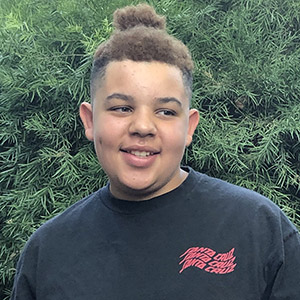
A Test of Resilience
Special Ed During SIP
BY SUKI WESSLING
 Interested in hearing more? Check the end of the article for a link to our podcast of the full interview!
Interested in hearing more? Check the end of the article for a link to our podcast of the full interview!
The January opening of Leo’s Haven, the new inclusive playground in Santa Cruz, was a milestone for children in our community. But Leo’s Haven closes where this story starts: When parents and teachers of students with special needs found out that they were going to have to shelter in place in mid-March.
“I still really haven’t processed that loss,” says Trisha Potts, who spearheaded the campaign to create a playground where her son, who uses a wheelchair, could play equally with his peers. ”Families who had been isolated because of barriers that they’d find at other playgrounds were coming together and just hanging out.”
Connection is important for families who have children with special needs. Their children have special medical, social, and educational needs that can be exhausting and expensive. Special needs parenting is so difficult that the Special Parents Information Network (SPIN) was developed to help parents, not students.
“We became therapists for everybody,” explains Cece Pinheiro, the executive director for SPIN, remembering back to when the schools were suddenly closed. “We have families with small children and they couldn’t leave them at home and go to work, and having a special needs kid on top of that!”
SPIN took immediate action. It turned out that they had already created emergency backpacks for their families, so Cece donned a mask and gloves and went on the road. “[The backpacks] actually have hand sanitizer and toilet paper in them—we didn’t know it would be such a popular item!”
The families struggled with everything that challenged all families, but even more so. At Trisha’s house, the beginning was definitely rocky.
“When the world fell apart on an educational level, I really noticed how back of the line our children got shoved. Everybody was just trying to survive, and they were trying to meet the needs of the majority.”
Rebecca York is a post-senior Special Ed teacher with the County Office of Education. She had recently returned to work from maternity leave, and she remembers it as a particularly difficult year even before SIP. She leads day classes for developmentally disabled young adults, and usually, their focus is being out in the community, developing skills.
“We were all on our toes for the first few days, not knowing what the future was to hold,” Becka explains. “There wasn’t a whole lot of direction in terms of what [the administration] wanted specifically.”
Special education includes all the usual components of education, but the “special” part is to provide whatever support or remediation students might need. In the case of Becka’s students, that means learning the skills that will allow them to lead their adult lives as independently as possible. Her students get paid to help out at restaurants and grocery stores through a WorkAbility Grant, and much of Becka’s job is to respond to the challenges that they face.
Having to stay home and use a computer was a challenge they had never faced, so Becka and her co-workers walked them through the process on the phone. Then they had to get creative.
“Their vocational goal was to follow a schedule of tasks at their job site”—where they were no longer able to go. “Now they’re following a visual schedule at home to do their daily tasks that I’ve assigned to them.”
Becka found that not only did her students eventually master the technology, but that she and her colleagues now see the benefit in helping them learn these skills. They’re planning to integrate more tech once they’re back in the classroom.
Meanwhile, Trisha was home with her three children, trying to provide the education that is usually provided through three IEPs (Individualized Education Programs), while also doing her own work. It was hard, she admits, but also rewarding.
“I found that my son was a whole lot more delightful than I thought he was!” she jokes. “He deals with extreme ADHD. I send him off to school well-medicated and oftentimes I get him back after a long day and his focus is not so great. We were actually able to engineer some breakthroughs because I had the time.”
Educators noticed that the usual boundaries between the formality of school and the informality of home broke down. In some ways, this was difficult and exposed the inequities of our society.
Cece could see that the parents served by SPIN were frustrated at best—and often in anguish having to choose between earning money to feed their families while risking their health, and staying home to care for their at-risk kids but not being able to provide for them. She asked them to focus on their families’ needs, and let her take on some of the burden.
“The big picture is my job, to talk to school district administrators, our legislators, senators, assembly people, our county board of supervisors and city councils,” Cece explains. “We need to become our own advocates. We’re in an impossible situation and advocacy really equals voting.”
Becka noticed that her students’ parents relied on her more once the boundary between school and home was breached.
“I feel like teachers became therapists or counselors, we were another shoulder to cry on,” Becka says. “I let parents know, just text me anytime—I’m home anyway!”
Everyone in special education is watching the road ahead warily. While school districts try to figure out how they can possibly provide basic services to typically developing children, special education services are likely to be pushed even further to the edge of the crisis.
Trisha expects a fight ahead.
“I understand we were in a crisis situation and kudos to the teachers for doing what they could,” she says. “But this is our new reality. How are we going to set up our schools in a meaningful way for our students with special needs when there’s so much emphasis that’s going to need to be placed on getting schools set up for kids that don’t have IEPs?”
Cece believes that for one, the fight to get back what has been lost starts with taking care of ourselves. “I get to get up and walk the dog every day and start my day out in nature,” she says. “I tend to be a ‘human doing’ rather than a ‘human being’!” I think when the dust settles we’re going to value our human connection more.”
Becka sees the silver lining in getting more time at home with her baby, and sharing her home life with her students. “When we are back together we will have this even stronger sense of community,” she predicts.
In many ways, though, what’s coming will seem familiar to families of children with special needs. Every step of their children’s education has been a challenge that has asked them to give them the most they could.
“One of the things that teachers and parents and children with disabilities have is resilience,” Trisha explains. “We have the ability to bounce back—our worlds have ended multiple times.”
Listen to our podcast of this interview! tinyurl.com/GUISCSpecialEd2020






